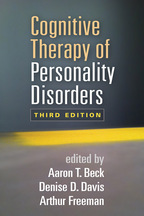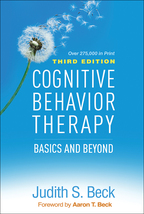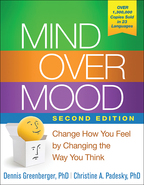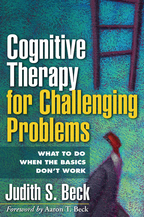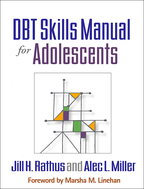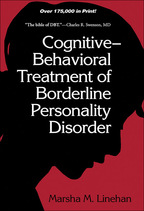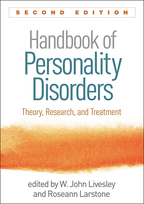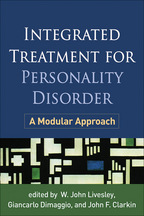Cognitive Therapy of Personality Disorders
Third Edition
Edited by Aaron T. Beck, Denise D. Davis, and Arthur Freeman
HardcoverPaperbacke-bookprint + e-book
Hardcover
orderOctober 8, 2014
ISBN 9781462517923
Price: $98.00 506 Pages
Size: 6" x 9"
Paperback
orderNovember 17, 2015
ISBN 9781462525812
Price: $65.00506 Pages
Size: 6" x 9"
“The diversity of the authors leads to a richness that is sometimes lacking when a single narrative perspective is applied to so broad a range of clinical presentations....An integrative, pragmatic text, that draws upon cognitive-behavioral, humanistic, and even psychodynamic traditions. It is bold and ambitious, and it is necessary reading for those interested in the development of personality disorders, and in the development of personality itself.”

—Cognitive Behavioral Therapy Book Reviews (on the second edition)
“The treatment approach is clearly stated....If you want to know about cognitive therapy as applied to personality disorders, this is the book to read....I really enjoyed this book because it contains the ABC's of cognitive therapy. The case examples are poignant and you can see how cognitive therapy principles are applied with each patient. Many of the authors are household names in the field, prominent experts who know what they are talking about. ****”

—Doody's Review Service (on the second edition)
“Personality disorders are debilitating conditions that, unfortunately, are far too commonly encountered in modern society. Fortunately, this remarkable volume shows just how far we have come in having the tools needed to successfully intervene when we encounter these conditions in the clinic. Particularly welcome in this third edition is the increased emphasis on connecting cognitive interventions with empirically based, dimensional models of personality disorder, such as the Alternative DSM-5 Model. An indispensable resource for students, practitioners, and researchers alike.”

—Robert F. Krueger, PhD, Distinguished McKnight University Professor, Department of Psychology, University of Minnesota
“The editors have assembled an international group of experts who provide practical, evidence-informed guidance on effectively managing difficult clinical situations. Using rich clinical examples and offering useful strategies, contributors illustrate how to manage the challenges and comorbidity so common in patients with personality disorders. Synthesizing a theoretical framework for understanding the organization of personality from a cognitive therapy perspective, strategies are grounded in neurobiology and incorporate sensitivity to cultural norms. Sections on treatment planning and progress monitoring address the patient’s well-being, while sections on therapist self-care acknowledge the demands of this kind of work. This volume belongs on the bookshelf of clinicians and educators—even if you have the prior edition.”

—Donna M. Sudak, MD, Professor of Psychiatry, Senior Associate Training Director, and Director of Psychotherapy Training, Drexel University College of Medicine
“I often say when lecturing to students that the most successful treatment for people with personality disorders is to send them (individually) to uninhabited desert islands. Without interaction with others personality disorder does not exist. So in treating personality disorders we are faced with a problem; how do we make the therapeutic relationship different from the client's previous relationships? This updated edition of a well-established book explains how—comprehensively and well. At the heart of cognitive behavior therapy is the building of collaboration and trust, a genuinely informed combination which the editors and authors of this volume show us ‘is probably more important when addressing personality disorders than in treating symptomatic problems.'”

—Peter Tyrer, MD, Centre for Mental Health, Division of Brain Sciences, Imperial College, London, United Kingdom
“Cognitive Therapy of Personality Disorders, Third Edition is a 'new classic.' This outstanding volume is completely updated, with extensive reviews of research as well as new conceptualizations and techniques, and it is filled with wisdom about the therapeutic relationship and other roadblocks to change. Every therapist interested in working with personality disorders—which should be every therapist—will want to read this volume and benefit from the clinical insights provided. I highly recommend this excellent resource.”

—Robert L. Leahy, PhD, Director, American Institute for Cognitive Therapy; Department of Psychiatry, Weill Cornell Medical College
“This seminal work updates and elaborates on one of the most important applications of cognitive therapy. Describing how to understand and change individuals' self-defeating behaviors that annoy or harm those around them, the third edition is further enhanced by chapters on assessment and the neural underpinnings of such beliefs and behaviors.”

—Steven D. Hollon, PhD, Gertrude Conaway Vanderbilt Professor of Psychology, Vanderbilt University
“I used this book in an Advanced Clinical Practicum with clinical psychology doctoral students. My students found it very useful, as did I. Students appreciated the examples of different personality disorder presentations and the systematic descriptions of interventions. One student noted, 'I see myself referring to this book throughout my clinical training and beyond as I work with more complex cases.'”

—Gregory H. Mumma, PhD, Associate Professor, Department of Psychological Sciences, Texas Tech University
—Cognitive Behavioral Therapy Book Reviews (on the second edition)
“The treatment approach is clearly stated....If you want to know about cognitive therapy as applied to personality disorders, this is the book to read....I really enjoyed this book because it contains the ABC's of cognitive therapy. The case examples are poignant and you can see how cognitive therapy principles are applied with each patient. Many of the authors are household names in the field, prominent experts who know what they are talking about. ****”
—Doody's Review Service (on the second edition)
“Personality disorders are debilitating conditions that, unfortunately, are far too commonly encountered in modern society. Fortunately, this remarkable volume shows just how far we have come in having the tools needed to successfully intervene when we encounter these conditions in the clinic. Particularly welcome in this third edition is the increased emphasis on connecting cognitive interventions with empirically based, dimensional models of personality disorder, such as the Alternative DSM-5 Model. An indispensable resource for students, practitioners, and researchers alike.”
—Robert F. Krueger, PhD, Distinguished McKnight University Professor, Department of Psychology, University of Minnesota
“The editors have assembled an international group of experts who provide practical, evidence-informed guidance on effectively managing difficult clinical situations. Using rich clinical examples and offering useful strategies, contributors illustrate how to manage the challenges and comorbidity so common in patients with personality disorders. Synthesizing a theoretical framework for understanding the organization of personality from a cognitive therapy perspective, strategies are grounded in neurobiology and incorporate sensitivity to cultural norms. Sections on treatment planning and progress monitoring address the patient’s well-being, while sections on therapist self-care acknowledge the demands of this kind of work. This volume belongs on the bookshelf of clinicians and educators—even if you have the prior edition.”
—Donna M. Sudak, MD, Professor of Psychiatry, Senior Associate Training Director, and Director of Psychotherapy Training, Drexel University College of Medicine
“I often say when lecturing to students that the most successful treatment for people with personality disorders is to send them (individually) to uninhabited desert islands. Without interaction with others personality disorder does not exist. So in treating personality disorders we are faced with a problem; how do we make the therapeutic relationship different from the client's previous relationships? This updated edition of a well-established book explains how—comprehensively and well. At the heart of cognitive behavior therapy is the building of collaboration and trust, a genuinely informed combination which the editors and authors of this volume show us ‘is probably more important when addressing personality disorders than in treating symptomatic problems.'”
—Peter Tyrer, MD, Centre for Mental Health, Division of Brain Sciences, Imperial College, London, United Kingdom
“Cognitive Therapy of Personality Disorders, Third Edition is a 'new classic.' This outstanding volume is completely updated, with extensive reviews of research as well as new conceptualizations and techniques, and it is filled with wisdom about the therapeutic relationship and other roadblocks to change. Every therapist interested in working with personality disorders—which should be every therapist—will want to read this volume and benefit from the clinical insights provided. I highly recommend this excellent resource.”
—Robert L. Leahy, PhD, Director, American Institute for Cognitive Therapy; Department of Psychiatry, Weill Cornell Medical College
“This seminal work updates and elaborates on one of the most important applications of cognitive therapy. Describing how to understand and change individuals' self-defeating behaviors that annoy or harm those around them, the third edition is further enhanced by chapters on assessment and the neural underpinnings of such beliefs and behaviors.”
—Steven D. Hollon, PhD, Gertrude Conaway Vanderbilt Professor of Psychology, Vanderbilt University
“I used this book in an Advanced Clinical Practicum with clinical psychology doctoral students. My students found it very useful, as did I. Students appreciated the examples of different personality disorder presentations and the systematic descriptions of interventions. One student noted, 'I see myself referring to this book throughout my clinical training and beyond as I work with more complex cases.'”
—Gregory H. Mumma, PhD, Associate Professor, Department of Psychological Sciences, Texas Tech University

